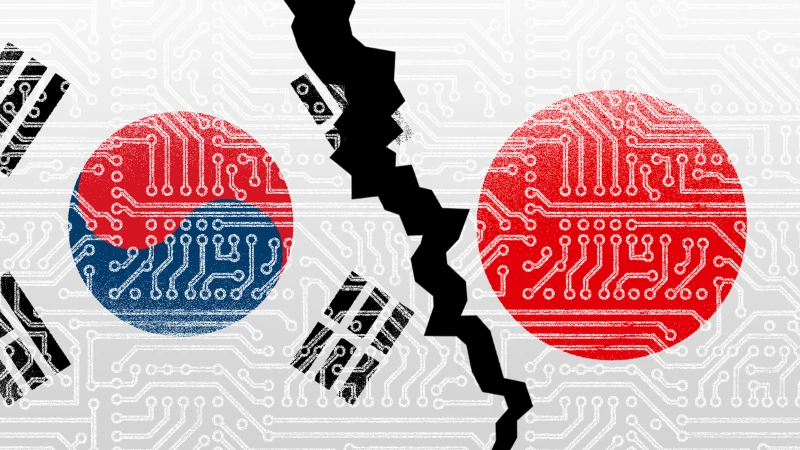
South Korea urged Japan to withdraw restrictions on exports of semiconductor materials at the World Trade Organization on Tuesday even as the Japanese side flatly denied imposing a trade embargo.
Tokyo's move "will disrupt the global value chain" and harm South Korean companies, Seoul envoy Paik Ji-ah said Tuesday in Geneva, according to a trade official who attended the meeting. Paik put the trade dispute on the agenda of the meeting at the last minute.
Paik said Japan had not justified its actions beyond citing a “damage of trust."
In response, Japanese representative Junichi Ihara said the measures are "not a trade embargo but an operational review necessary for proper implementation of Japan's export control system based on security concerns."
In what is widely seen as a retaliatory move, Japan placed export curbs on South Korea-bound chipmaking materials Thursday after Seoul failed to intervene with Supreme Court rulings ordering Japanese companies to pay those forced to work for them during World War II.
Seoul has called the restrictions politically motivated and said they had "no basis" in WTO rules, hinting at formally lodging a complaint with the organization.
Meanwhile, Japanese Trade Minister Hiroshige Seko told a press conference in Tokyo on Tuesday that Japan does not intend to back down. "It is not subject to negotiations [with South Korea], and it cannot be just withdrawn," he said.
Countries are supposed to try to resolve trade disputes between themselves before the WTO sets up a settlement panel. Japan does not plan to participate in any consultations that would lead to formal complaints with the WTO.
Seko did say he looks to explain Japan's position to South Korea through working-level talks, and South Korean Trade Minister Sung Yun-mo is expected to attend a meeting in Tokyo on Friday.
The curbs require Japanese companies to seek government approval for each contract involving exports to South Korea of three materials used in the chipmaking process: resist, etching gas and fluorinated polyimides. Companies in both countries are now grappling with how the spat could wreak havoc on chip production in the long term.
South Korea's Samsung Electronics and SK Hynix control 50% to 70% of the world's semiconductor market. The impact on the supply chain will thus be far reaching, with Japanese computer makers certain to take a hit.
"There will definitely be an impact on parts supply," said Kaoru Hayashi, a director at Vaio. The spinoff of Sony's personal computer operations has not made its list of chip suppliers public, but Hayashi said the company will consider alternative sources outside South Korea.
"We are still not sure how much of an effect there will be," said Kiyofumi Kakudo, president and CEO of laptop maker Dynabook, a Sharp subsidiary.
South Korean chipmakers are scrambling to minimize the damage. Samsung recently sent representatives in charge of supply to Taiwan, likely to push for greater shipments of etching gas from manufacturers there.
Samsung was thought to have a month's supply of etching gas as of July 1, when the Japanese government decided on the export controls.
"Now it has secured three months' worth, enough for the time being," a South Korean industry insider said.
Lee Jae-yong, vice chairman of Samsung Electronics and the group's de facto chief, arrived in Japan on Sunday. He has met with executives from Japan's megabanks, and could meet with business partners if necessary. The company also has sent emails to Japanese suppliers unaffected by the export controls, asking them to ensure stable shipments.
"[Samsung] seems to be more concerned than ever that worsening ties between Japan and South Korea would impact production," said an executive at a Japanese chemical maker.
LG Chem is preparing in case the dispute spreads. Vice Chairman Shin Hak-cheol told reporters Monday that the company is considering scenarios in which Japan imposes similar restrictions on more products.
Japanese suppliers of the chipmaking materials are feeling the heat as well.
"We need to prepare more documents now that each contract needs to be screened," said a representative at JSR, a Tokyo-based producer of resist.
"We are gathering the necessary documentation to make sure our export applications are in order," said Tokyo Ohka Kogyo. The company says it now must obtain a contract from South Korean clients promising they will not illicitly resell resist.
Japan's official position is that it revoked preferential treatment for South Korea over national security concerns. Requiring approval for each contract only puts South Korean importers on even ground with their Chinese and Taiwanese counterparts, and they should still be able to buy Japanese materials as long as they pass the screening.
But most in South Korea see the move as retaliation for Seoul's inaction over the wartime labor rulings. "There are concerns whether South Korean companies will face unfair decisions," a chip industry insider said.
South Korea's government has said it will budget 1 trillion won ($845 million) yearly to promote domestic production of chipmaking equipment and materials. Yet the countries are about 20 years apart in the field, and "it will take more than one or two years for us to see any results," said Ahn Ki-hyun, a senior official at the Korea Semiconductor Industry Association.




















